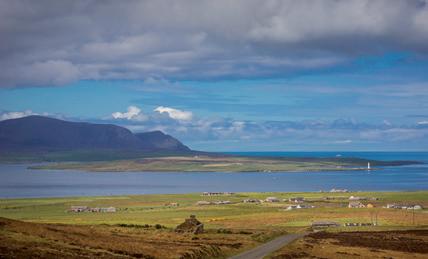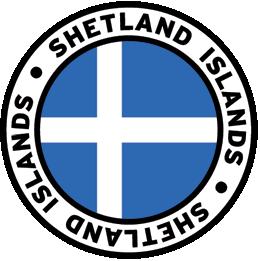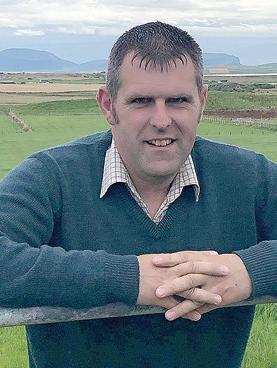
7 minute read
Stories from Orkney and Shetland


Advertisement
NORTHERN ISLES
News

Under the microscope — again
Orkney has ‘first-class’ livestock transport system as Scottish Government prepares to hold 11-month review
By Mark Harcus


President of the Orkney branch of the NFU Steven Sandison, who says the current arrangements for transporting animals is “first-class.”
A review of the current arrangements that regulate the shipping of livestock from Orkney and Shetland to the Scottish mainland is set to take place.
Following a recommendation by the UK Farm Animal Welfare Committee, the Scottish Government is in the early stages of a project which will investigate and inform consideration of possible future changes to animal transport, and how journey times at sea should be treated.
It will come as a disappointing body blow for the industry, less than 12 months on from two separate government consultations, which sparked huge concern for the very future and viability of Orkney’s biggest industry.
Eventually, the Scottish Government confirmed that no changes would be enforced, to the relief of Orkney’s agricultural industry.
A contract notice for tenders for a 11-month project, running from February to December, 2023, which will explore the effect of sea vessel movements on cows and sheep, has now been issued on the Public Contract Scotland website.
In the description of the contract notice, it is recognised that livestock movements are “essential to the economic viability of livestock production in the Northern Isles” and anything to disrupt this trade or involve additional costs would be “highly sensitive”.
A Scottish Government spokesperson said: “The Scottish Government takes animal welfare very seriously.
“This project follows a recommendation made by the UK Farm Animal Welfare Committee, to review how journey times at sea should be treated, either as ‘neutral time’ as it is now, or alternatively as rest or travel time.
“This year-long project will look at the welfare impacts on livestock undergoing these journeys, with a view to inform future animal welfare policy.”
The current specific “cassette” system was introduced 20 years ago and sees livestock transported into specially designed transport containers — known as “cassettes.”
The containers ensure welfare is maintained during transit, providing suitable arrangements for bedding, drainages, feed and water, ventilation and inspection.
A key area of investigation for the proposed project is to review the concept of “neutral time.”
Currently, the time in the cassette system is classed as “neutral time” rather than rest or travel time for the purposes of livestocktransport legislation.
This interpretation was questioned by the UK Farm Animal Welfare Committee, which recommended a review should take place.
Noting the early stage of the process, the president of the Orkney branch of the NFU, Steven Sandison, expressed his confidence that the industry had nothing to fear.
“This issue was covered extensively only last year, during a lengthy consultation process, which we thought would be the end of the matter,” said Mr Sandison, of Millburn Farm in Harray.
“We are very fortunate to have a first-class system for the transportation of our stock to the mainland. It’s in everyone’s interest to have the stock transported in the very best conditions.
“If there should be a review sometime in the future, I’m very confident it will only confirm what we already know.”
In the ten years that Serco NorthLink Ferries has operated, the company has carried and transferred 1.4million sheep and 265,000 cattle.
The outcome of ferry journeys in the cassette system for animals in different weather and sea conditions has been monitored by APHA and local authority inspectors since it was introduced and is believed to be generally acceptable, although the Scottish Government says that anecdotally animals can sometimes appear tired when they arrive after particularly rough crossings.
The Scottish Government says that more formalised monitoring of the temperature within the cassettes, humidity and

vessel movements experienced by the animals during different weather and sea states, and any effect of these on the condition and behaviour of animals after arrival on these commercial journeys, would provide more reliable information to inform a review of the “neutral time” interpretation.
Researchers will be expected to familiarise themselves with the cassette system, and liaise with NorthLink Ferries and other key stakeholders to secure their cooperation.
This work would include gathering information on typical current journeys, including the numbers and classes of livestock being carried on different routes, journey times, and the range of weather and sea conditions experienced throughout the year.
There would be a steering group meeting to agree the approach to be taken to further work after this initial scoping.
However, the project has raised questions for a concerned Liam McArthur.
After being approached for comment, Orkney’s MSP said of the crucial importance of the transport of livestock in the isles.
“This must, of course, meet the highest animal welfare standards, which is what the local sector has worked hard to achieve over the years as part of successful efforts to build a strong reputation for quality.”
He said that further restrictions on livestock transport, as proposed in the UK Government consultation last year, would have brought farming in Orkney “to a standstill.”
“There was no evidence to back these proposals and, in the face of opposition from farmers, vets and politicians from all parties, the plans were thankfully dropped,” said Mr McArthur.
“It is a concern, therefore, to see the Scottish Government now looking to carry out work of their own on very similar proposals. While ministers appear to recognise that “anything that would disrupt [livestock transport] or involve additional costs is highly sensitive” this is unlikely to allay fears that such restrictions will be introduced regardless.
“The sector in the Northern Isles will always be open to looking at ways in which farming methods and practices can be improved. They have a track record to back this up. However, you don’t improve farming in the islands by effectively shutting it down.
“I have been in touch with the cabinet secretary to highlight my concerns and will be following this up next week when Parliament returns after the October recess.”
Sheep livestock caption: Over the last ten years, 1.4million sheep and 265,000 cows have been transported from the Northern Isles to the Scottish mainland in the current “cassette” system. However, a 12-month project is set to review the current arrangements and the classification of “neutral” time.
Sheep scab warning on Shetland
Around a tenth of sheep imported to the isles recently have suffered from sheep scab – serving as a “wake-up call” to animal health staff.
Blood testing results indicate eight per cent of sheep entering Shetland have tested positive for sheep scab at the pier, while a further five per cent have tested as suspicious for the condition. The concerning results have been described as “much higher than expected” – and prompted a reminder for continued use of new dipping facilities at the marts, even if that does mean incurring a financial burden.
Animal health research officer Lyall Halcrow said dipping remained important to help maintain Shetland’s excellent animal health record. “This import season, blood testing results indicate that eight per cent of sheep have tested positive and five per cent have tested suspicious for sheep scab at the pier,” he said.
“The test demonstrates exposure to sheep scab and possible presence of sheep scab mites and infectivity.
“This proportion is much higher than expected, and shows it is important that everyone is especially mindful when importing sheep.”
He added: “We were expecting one per cent of sheep would test positive. It is a high figure. It is a wake-up call.”
Earlier this year, 10,000 potential contact sheep across Shetland were dipped following the first case of sheep scab in the isles since 1994.
Environmental health says this was most likely due to mites on an imported ram beingresistant to the injectable product used at the pier.
Mr Halcrow added: “Resistance and lack of efficacy reports for the injectable is on the rise in the UK and Scotland, and dipping is the only effective treatment against these resistant mites. In response, Shetland Livestock Marketing Group (SLMG) opened the new dipping facility for imported sheep in September.
Mr Halcrow said the “vast majority of importers” have been presenting their sheep this year.
But he warned against complacency and said it was important they continue to use the sheep-dip.
“Dipping is the only way we can ensure Shetland is kept free of sheep scab, so please ensure your sheep are either dipped on import, or discuss with your vet if you plan to have sheep dipped prior to importation.”
The blood test screening has been funded by Livestock Health Scotland and administered by the Shetland Animal Health Scheme and Shetland Vets.


www.shetlandtimes.co.uk Tel: 01595 742000 In association with
www.orcadian.co.uk Tel: 01856 879000










